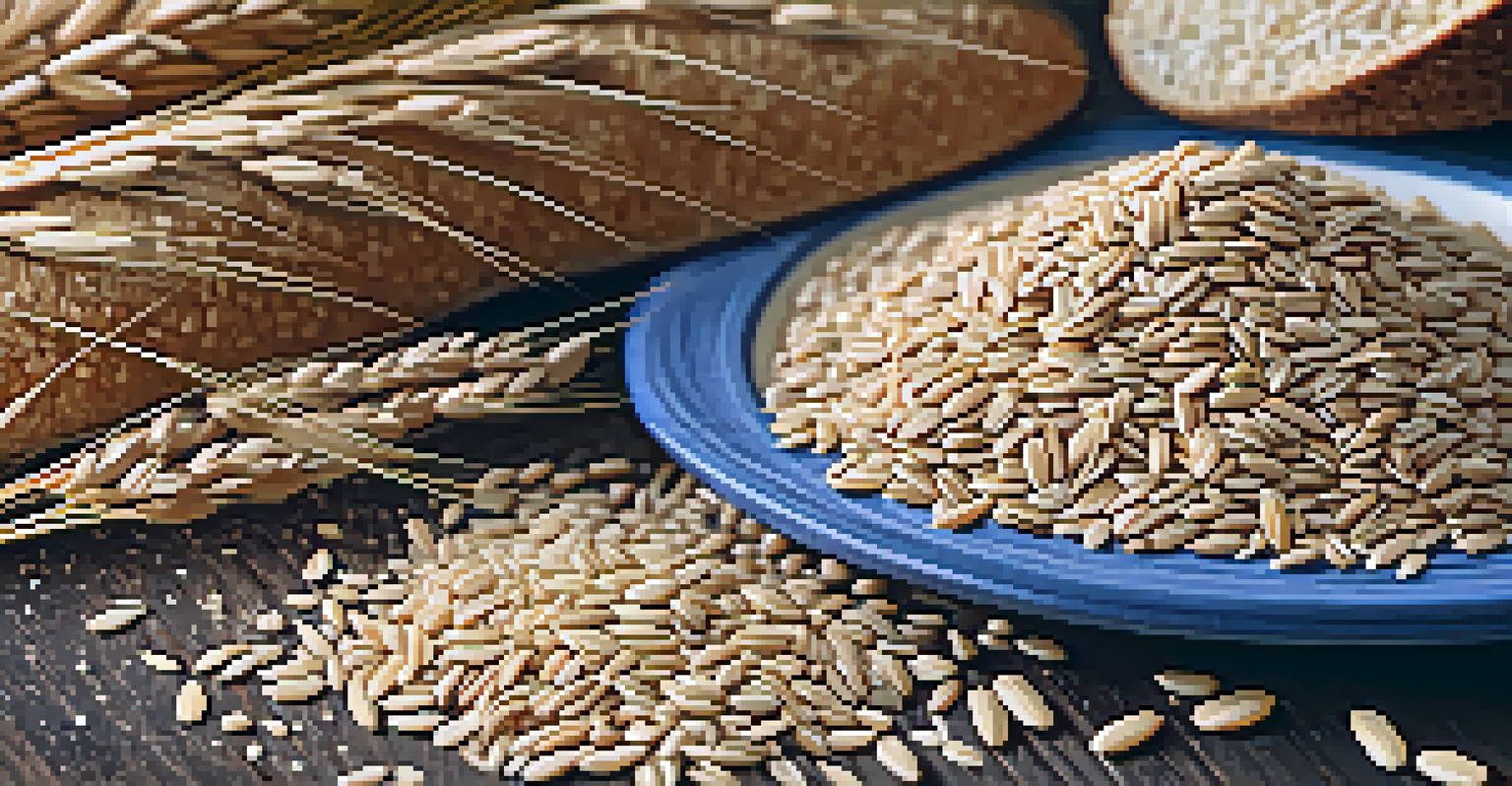Nutrition's Role in Preventing Type 2 Diabetes

Understanding Type 2 Diabetes and Its Risk Factors
Type 2 diabetes is a chronic condition that affects how your body metabolizes sugar, leading to high blood sugar levels. Various factors contribute to its development, including genetics, age, and lifestyle choices. Among these, diet plays a critical role, as certain foods can either increase or decrease your risk. Understanding these risk factors is the first step in prevention.
Let food be thy medicine and medicine be thy food.
Risk factors like obesity, physical inactivity, and poor nutrition can elevate your chances of developing Type 2 diabetes. For instance, diets high in refined sugars and unhealthy fats are particularly concerning. Moreover, family history can increase your risk, making it essential to adopt healthier eating habits. By being aware of these factors, you can take proactive steps towards a healthier lifestyle.
Recognizing the links between these risk factors and Type 2 diabetes empowers you to make informed dietary choices. It’s not just about what you eat, but how your overall lifestyle affects your health. By focusing on nutrition, you can significantly lower your risk and improve your quality of life.
The Power of Balanced Nutrition in Diabetes Prevention
Balanced nutrition is all about consuming a variety of foods in the right proportions. This approach helps maintain healthy blood sugar levels and supports overall well-being. Incorporating fruits, vegetables, whole grains, and lean proteins into your diet can make a significant difference. Each food group plays a unique role in providing essential nutrients your body needs.

For example, fiber-rich foods, like beans and whole grains, help slow down glucose absorption, preventing spikes in blood sugar levels. Healthy fats, such as those found in avocados and nuts, can also be beneficial. Making conscious choices about what goes on your plate can help you maintain a healthy weight and reduce your risk of diabetes. It's all about creating a balance that works for you.
Healthy Diet Lowers Diabetes Risk
A balanced diet rich in whole foods, healthy fats, and regular meals can significantly reduce the risk of developing Type 2 diabetes.
Ultimately, balanced nutrition is not just a short-term goal; it's a lifelong commitment. By embracing a diverse diet, you can enjoy meals while also taking care of your health. Remember, every small change adds up, so start by incorporating more whole foods and reducing processed ones.
The Role of Whole Grains in Blood Sugar Management
Whole grains are often hailed as a cornerstone of a healthy diet, particularly in diabetes prevention. Unlike refined grains, whole grains retain their bran and germ, making them richer in fiber, vitamins, and minerals. Foods like brown rice, quinoa, and whole wheat bread can help regulate blood sugar levels effectively. They provide sustained energy while preventing rapid spikes in glucose.
You are what you eat, so don't be fast, cheap, easy, or fake.
For instance, when you consume whole grains, the fiber slows down digestion and absorption, leading to a gradual increase in blood sugar. This is crucial for those looking to prevent Type 2 diabetes. Plus, whole grains may help improve insulin sensitivity, a key factor in managing blood sugar levels. By swapping refined grains for whole grains, you’re making a smart choice for your health.
Incorporating whole grains into your meals doesn’t have to be complicated. Simple swaps, like choosing oatmeal for breakfast or whole grain pasta for dinner, can make a substantial difference. The benefits of these nutrient-dense foods far outweigh any convenience offered by refined options.
The Importance of Healthy Fats for Diabetes Prevention
Not all fats are created equal, and understanding this can greatly influence your risk of Type 2 diabetes. Healthy fats, primarily unsaturated fats found in sources like olive oil, nuts, and fish, can help maintain healthy insulin levels. In contrast, trans fats and saturated fats can lead to inflammation and increase insulin resistance. Choosing the right types of fat is essential for overall health.
Including healthy fats in your diet can also promote heart health, which is particularly important for individuals at risk of diabetes. For example, omega-3 fatty acids found in fatty fish like salmon have been shown to reduce inflammation and improve heart health. These benefits further demonstrate how smart dietary choices can have a far-reaching impact.
Hydration Supports Metabolism
Staying adequately hydrated is crucial for maintaining optimal bodily functions and regulating blood sugar levels.
Incorporating healthy fats into your meals can be as simple as adding avocado to your salad or snacking on a handful of nuts. These small changes can lead to significant health improvements. Remember, it’s not just about cutting out unhealthy fats, but also about embracing the healthy ones.
The Impact of Sugar and Processed Foods on Diabetes Risk
Sugar and processed foods are often at the center of discussions about diet and diabetes. High sugar intake can lead to weight gain and increased blood sugar levels, both of which are significant risk factors for Type 2 diabetes. Processed foods, which are often loaded with added sugars and unhealthy fats, can also contribute to poor dietary choices. Being mindful of what you consume is essential for prevention.
For instance, choosing whole, unprocessed foods over sugary snacks can help you maintain a balanced diet. Reading food labels can also empower you to make healthier choices. By being aware of added sugars in seemingly innocent foods like sauces and dressings, you can significantly reduce your overall sugar intake. This simple practice can have a profound impact on your health.
Making the shift away from sugar-laden and processed foods may seem daunting, but small changes can lead to significant results. Consider replacing sugary drinks with water or herbal tea, and opt for fresh fruits as snacks. Over time, these adjustments can help you develop a healthier relationship with food.
The Role of Regular Meals and Portion Control
Establishing regular meal patterns and practicing portion control are vital strategies in preventing Type 2 diabetes. Eating at consistent times can help regulate blood sugar levels and prevent excessive hunger, which often leads to overeating. Furthermore, being mindful of portion sizes ensures that you’re not consuming more calories than necessary. These habits can create a stable environment for your body to thrive.
For example, instead of skipping meals and bingeing later, try to plan your meals and snacks ahead of time. This approach can help you maintain steady energy levels and avoid unhealthy food choices. It's also important to pay attention to hunger cues and eat until satisfied, rather than full. This encourages a more intuitive eating style.
Portion Control is Essential
Practicing portion control and establishing regular meal patterns help stabilize blood sugar levels and prevent overeating.
Implementing these practices doesn’t need to be overwhelming. Start by setting specific meal times and gradually adjusting your portions. Over time, these habits can help you build a more structured and health-focused lifestyle, reducing your risk of developing Type 2 diabetes.
Hydration's Role in Supporting Healthy Metabolism
Hydration is often overlooked in discussions about nutrition and diabetes prevention, but it plays an essential role. Drinking enough water helps maintain optimal bodily functions, including metabolism and digestion. Adequate hydration can also help regulate blood sugar levels, as dehydration can lead to higher blood glucose concentrations. Therefore, staying hydrated should be a priority.
Incorporating water into your daily routines can be as simple as carrying a water bottle or setting reminders to drink throughout the day. Herbal teas or infused water with fruits can also add variety and flavor. By making hydration a habit, you can support your body’s natural processes without feeling deprived.

Remember, hydration needs can vary from person to person, but aiming for at least eight cups a day is a good starting point. Listening to your body and adjusting your intake according to activity levels and climate can further enhance your hydration. Ultimately, a well-hydrated body is a key player in preventing Type 2 diabetes.